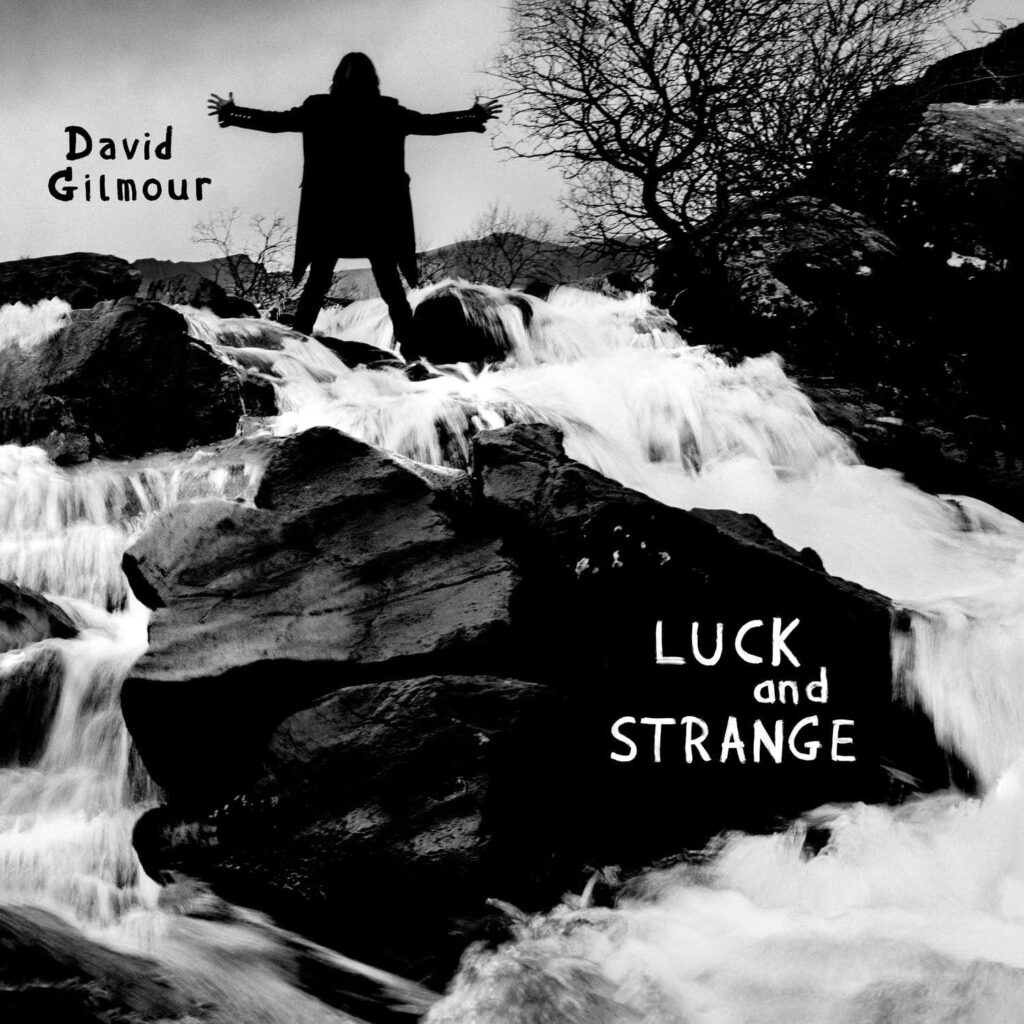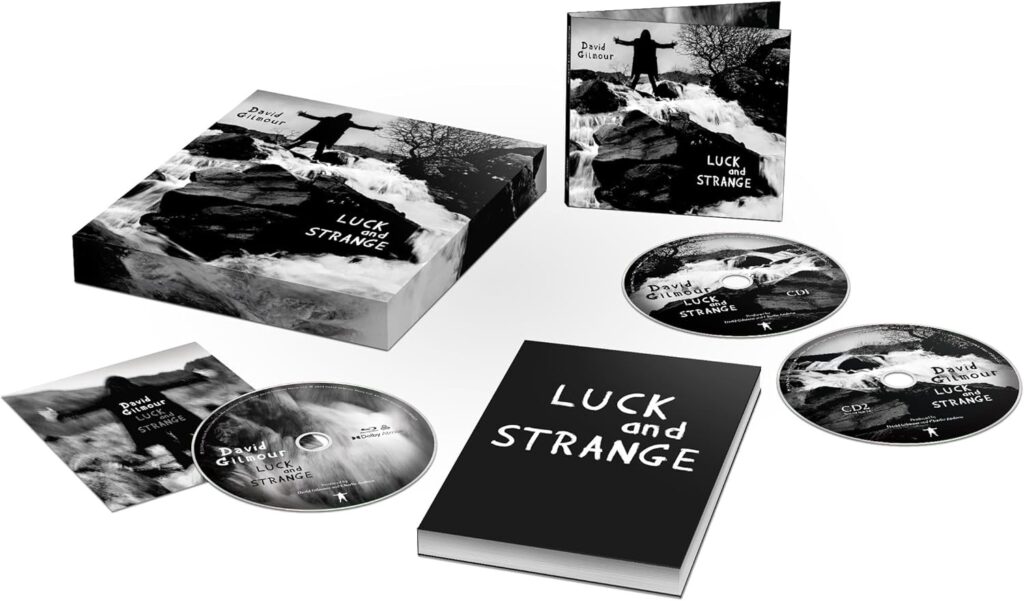
David Gilmour has hardly been prolific throughout the 00s. Releasing only a pair of well-received solo albums, as well as the unexpected Pink Floyd swansong (The Endless River), he works at his own pace, making each artistic endeavour (and accompanying tour) something special.
It has been eight long years since David’s last solo album, Rattle That Lock, and its ensuing tour (a fifty-date run that encompassed just over a year), with little subsequent activity beyond a live album (Live in Pompeii – released in 2017), and a certain amount of through-gritted-teeth Pink Floyd reissue campaigns.
Preferring to experience David’s work as a complete piece, I largely managed to avoid the teasers that emerged in the run up to release, with the result that any pre-judgement was based on Anton Corbijin’s atypical artwork (more Depeche Mode than Hipgnosis), and David’s surprising assertion that this is his favourite record since Dark Side Of The Moon. Even more surprising is that, while Luck And Strange is hardly destined to be as epochal as that album, I can understand David’s reasoning, for there is a wonderfully loose vibe to the album that really sounds like he was having fun with this one. Perhaps, with the ghost of Floyd finally laid to rest, David feels more comfortable to just be himself. Whatever it is, the album covers the gamut of David’s career, from blues-infused rock to psyche-prog jams that hark all the way back to Echoes, and it finds David consistently confounding the listener’s expectations, all the while sounding like no one other than himself.
The Package
Unfortunately, in pretty strong contrast to David’s previous solo efforts, the forces of commerce have come heavily into play with this release. On An Island was fairly low-key, initially only landing on CD, with vinyl and a fairly basic special edition arriving later down the line. The live album that followed (recorded in Gdansk), did offer some different editions, but nothing too exceptional, or too expensive. Rattle That Lock came in a far larger range of editions, with basic CD, vinyl box set, and a deluxe CD/blu ray on offer. The latter was, however, good value at under £50. Similar in style to the Floyd boxes from around that time, it contained a book, postcards, the CD, and a feature-packed blu ray.

Luck And Strange is neither so straight forward, nor such good value. The basic CD boasts two bonus tracks, is packaged in a fairly bare bones digipack, and comes in at around the £15.00 mark. The blu ray is extravagantly expensive, given that it’s a standalone release, at around £30; and the box set, which bundles the album CD, blu ray, and 5-track bonus CD, is ludicrously priced at around £80. There’s also a double vinyl edition (available both as a retail edition and Amazon exclusive, with alternate cover), which sits at the more standard price of £35. All in all, it’s a case of fewer extras for considerably more money, and it’s disappointing when you consider the value represented by the box sets for Momentary Lapse Of Reason, Delicate Sound of Thunder, and Rattle That Lock.
This review covers the CD edition only.
The Album
The album opens with a short instrumental, the gorgeous Black Cat, which nods to post-Waters Floyd, as does the bluesy Luck And Strange. With the late and much missed Richard Wright’s keyboards prominent in the mix, and Gilmour allowing a touch of touch of Clapton’s work with Floyd collaborator Michael Kamen to enter proceedings, it’s a track that wouldn’t sound out of place on MLOR, modern production notwithstanding, and it proves an engaging opening gambit that draws the listener back in to Gilmour’s languid, gently progressive world. Lead single The Piper’s Call is up next, and it provides a nice counterpoint to the expansive blues that preceded it. With a stunning mix that captures the depth of the arrangement, it’s easy to see why it was chosen as a single, and it is one of those tracks that only grows in stature the more you listen, especially given the gritty climax to which it builds. With David unleashing a fiery lead, it really sounds like he and the band had fun in the studio with this one. The first half wraps up with a calmer piece. Titled A Single Spark it sits somewhere between David’s past work, Leonard Cohen and, most surprisingly, Blur circa 13. An engaging track that benefits no end from Adam Betts’ deftly understated percussion, it sees David exploring new sounds, all the while remaining tethered to his core identity.
A short scene setter, Vita Brevis opens the second half of the album, David’s lush slide set against strings and gently rippling chords. It paves the way for an absolute gem – Between Two Points – which finds David collaborating with youngest daughter, Romany on a Montgolfier Brothers song. Where familial collaborations can bring risk, here the pair forge an unmistakable musical bond that recalls that which David shared with Rick. The atmosphere, vocals, and guitar work are all beautifully worked to create a piece of music that boasts genuine depth and warmth, and it marks an album high point that is both truly majestic and quite unlike anything David has attempted before.
The surprises continue as David pitches a surprisingly hard-edged track in the form of Dark And Velvet Nights. With some cool percussive tricks and a grittier vocal than we’ve heard since Take A Breath, it’s the perfect follow on to the lovely Between Two Points. With the album racing past, the slight Sings is a nice enough piece, although it proves less memorable than that which came before. However, David is not out of surprises just yet, and the lovely Scattered finds echoes of Echoes in the keys, while the lyrics (written by David, Charlie, and Polly) speak of age and loss, even nodding to Floyd’s Endless River swansong. With some truly unexpected changes, including a lengthy mid-section that bridges Echoes with the thunderous piano from A Day In The Life, not to mention hints of High Hopes in the solo, it’s arguably the most progressive piece David has put his name to in years, and it is a truly wondrous closer for the album.
The CD edition comes with two bonus tracks. The first, Yes, I Have Ghosts, is another piece featuring the exquisite talents of Romany, while David crafts a wonderfully whimsical piece of music to sit alongside Polly’s poignant lyrics. Then there’s Luck And Strange (Original Barn Jam Version). A twelve-minute jam, it’s a genuine treasure and a lovely reminder of the instrumental interplay between Gilmour and Rick Wright, whose keyboards shine across the song. With the album’s lyrics so often speaking of love and loss, it’s a fitting finale, paying tribute once more to a bandmate whom David so obviously misses.
Conclusion
While both On An Island and Rattle That Lock contained some exquisite moments, Luck And Strange is arguably the record that comes closest to realising the promise of David’s stunning solo performances at Robert Wyatt’s Meltdown. Gently progressive, with some truly surprising moments (not least Between Two Points), it’s the record that, with time, may well come to be judged as David’s finest solo effort. 9.5/10



